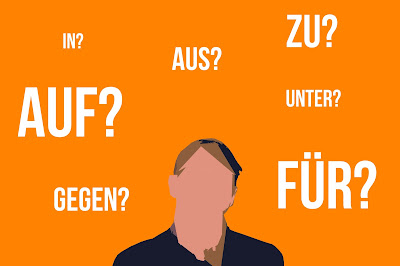Learning German: Three Common Mistakes
The first, and perhaps hardest, part of learning a language
is to get out of what I like to call the danger zone. Out of the „how do
I say it in my own language“ mindset and into the „how do I say
it in German“ mindset. Thinking exclusively in the target language
is probably the most important technique to master. Because, as ideal
as it would be to simply think in the mother tongue and come out with
perfect German, that's not exactly how it works. And it is this
tendency to keep thinking in one's own language that causes repeated
mistakes. But not to fear! Because so many people do it, we've
managed to find some of the most common mistakes that seem to repeat
themselves. So let's have a look at some of them together and see if
we can knock them on the Kopf.
Mistake #1
PREPOSITIONS
If I could go back in time
to my 12 year old self, innocent and naive, sitting in my first
German class with my whole future ahead of me, excited and ready to
step into the dark and mysterious world of the German language, I
would bring a grammar book, open it at page „prepositions“, place
it on the desk and whisper, „it's not too late to turn back“.
Prepositions are, for me, one of the hardest parts of learning
German, and something that us English speakers seem to have an
eternal struggle with. I have a battle with myself every single day
trying to choose the right preposition. Auf? An? In? Unter? I haven't the faintest idea. So I take the English equivalent and
translate it literally, hoping for the best, and am usually met with
blank stares. Or the „at least she's trying“ look. So where am I
going wrong?
1. AUF/IN
You're on your way to work. Your boss calls you. He wants to know where you are. You want to say „I'm on the train“. You give it a go. „Ich bin auf dem Zug“. But hold it right there my dear English speaker. Maybe you actually are perched ON TOP of the train, with the wind in your hair, but I don't think that's what you intended to say. You are, technically, IN the train. (This is where English is the difficult one). So when referring to transport in German, always use „in“. Unless (because there's always an „unless“) you're travelling by ship. THEN we use „auf“.
You're on your way to work. Your boss calls you. He wants to know where you are. You want to say „I'm on the train“. You give it a go. „Ich bin auf dem Zug“. But hold it right there my dear English speaker. Maybe you actually are perched ON TOP of the train, with the wind in your hair, but I don't think that's what you intended to say. You are, technically, IN the train. (This is where English is the difficult one). So when referring to transport in German, always use „in“. Unless (because there's always an „unless“) you're travelling by ship. THEN we use „auf“.
2. VON/AUS
In English we use „from“ to denote
origin. „The chocolate comes from Switzerland“. So you translate
it literally, thinking it must be right. „Die Schokolade kommt von
der Schweiz.“ Who is „der Schweiz?“ And why is he giving you
chocolate? Can he give me some, too? You see, in German, this sounds
like you received the chocolate from a person called „der Schweiz“.
In German, origin is expressed with „aus“. „Ich komme aus
Frankreich“, „Die Schokolade kommt aus der Schweiz“. And
remember – AUS always takes the dative!
3. FÜR
„For“ is a word that gets chucked
around all the time in English. It indicates the use of something,
time or duration, purpose, „because of“, the list goes on.
WARNING: „I'm waiting for my friend“ is correct in English. „Ich
warte für meine Freundin“ is not. Warten + auf. Immer, immer,
immer.
Mistake #2
Mistake #2
It's getting heiß in here: Thermal
Issues
It's Saturday night. You're at the club
with your pals. Perhaps a young man/lady approaches you. You dance
together. Everyone's having a great time, but after a while you
decide you've had enough. But how to escape? Ah, great idea! Tell
them you're too warm and you need to step outside. „Entschuldigung,
ich möchte kurz raus. Ich bin hei-“ Stop. Right. There. This is a
typical example of why thinking in English can potentially get you
into trouble. Or at least into some awkward situations. Yes, in
English you may well be hot. But in German, this carries rather
different implications. In German you are not hot, rather it is „hot
to you“. Don't argue with the rules, just use them. Say it with me:
„Mir ist heiß. Mir ist kalt.“ Or your night might go a little
differently from how you expected.
And mistake #3
And mistake #3
WHEN
„When I was a kid, I used to dream of
learning German. When I am older, I will still love learning German.
Hey, guys! When are we learning German?“ What do you notice about
all of these sentences? It sounds like I've been brainwashed? Wrong!
No, despite referring to different time periods, they all use
WHEN. One word, nice and easy. But the Germans decided that was no
fun, and thought it better to have three different words: wenn, wann
and als. Thanks guys. It is common for English speakers to simply use
„wenn“ all the time, because it's easy, and it sounds the most
like the English equivalent. Well, don't. The rules are simple. You
can do it.
Wann: always with questions. (That goes
for implicit questions as well. Do you know when he is coming? Weißt
du, wann er kommt?)
Wenn: future, present and
past events. (Note: past events that happened more than once)
Als: past event that happened one time.
(The way I remember this is ONE = 3 letters, ALS = 3 letters. Easy!).
Of course, we all make our own
individual mistakes and all have our own difficulties, but above are
a few of the ones I find most common. Do you find yourself making
mistakes like these? Or do you know any others that we often tend to
get wrong? Comment and let us know!
Bonnie






Comments
Post a Comment